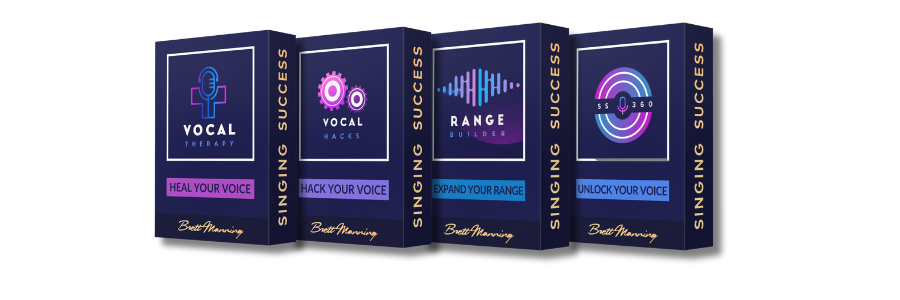by Brett Manning
If you’ve ever had to fight off a yawn during a performance, you can understand how frustrating it can feel.
Not only is it distracting to always have that nagging sensation of needing to yawn, but it can take away from your performance, and it also isn’t a fantastic view for the audience.
So, why does this happen?
When you sing with proper technique, it sometimes involves raising the soft palate and opening your throat. Both of these things happen when you yawn, and it can confuse your brain, triggering your yawn reflex.
This, among other things, can cause yawning during a vocal performance. Other factors might include, exhaustion, improper breathing techniques, dehydration, and stress.
Don’t despair! There are ways to get rid of those pesky yawns and you’ve come to just the place for answers.
*Let’s be sure about something right now. Typically, raising your soft palate isn’t necessary unless you talk like Fran Drescher or Marlon Brando in the original ‘Godfather’. His tone was excessively nasal and his throat closed off.
Fast-Track Your Success!!

VIP Membership includes:
- Exclusive Facebook Group
- Interact with our vocal coaches–ask them YOUR question
- Live warmups
- Masterclasses and Q&As with Brett Manning and his guests
- SS360 QuickStart Program
- SS360 – The FULL Systematic Vocal Course
- Vocal Hacks
- Range Builder
- Mastering Mix
- Mastering Harmony
- Mastering Vibrato
- Vocal Therapy
- Plus…exclusive content only found here all along the way!
You can struggle on your own, or you can get direct access to the Nashville Coaches who have launched some of the biggest names in the music industry.
Why Do We Yawn?
Say you’ve gotten eight hours of sleep every night, but you’re still yawning when singing. What’s that about?
There are many more reasons for yawning besides getting adequate sleep.
Yawning is a Reflex

There are many reasons we yawn. Yes, not having enough sleep is the most common answer, but yawning is also a natural reflex.
Have you ever noticed how yawns are contagious? That would be why. If you’re performing, and an audience member starts to yawn, find a wall and glue your eyes there.
In fact, I remember giving a masterclass to an audience of 800 singers in Singapore (that read well 😉) and I was talking about the 7 breaths. When I finally got to the yawn—which I can activate and deactivate at will—the whole entire audience yawned. When I pointed this out and they all looked around the room, they started yawning even more! It was funny. And it was predictable.
You see, if you’re not taking in enough oxygen, your brain signals for help and your body responds with a wide, stretching, satisfying yawn.
Because most of us DON’T take deep, long breaths throughout the day we develop what I call a “breathing drought”. The body’s response is because yawning serves as an actual reminder that you lack meaningful oxygen levels in your body. Much like thirst and hunger remind us to eat and to hydrate.
There are many things scientists still don’t understand about yawning and why we do it, but it seems directly related to changing conditions within the body. If our state of alertness is changing, we often yawn. That would be why it’s often associated with boredom.
But as a performer, you do not need to presume boredom. Lack of sleep, low energy, and overall fatigue should be the first and most obvious reasons.
Understanding the Soft Palate and its Role in Yawning
When we yawn, the soft palate lifts, allowing the throat and mouth to open, and the larynx to depress. Lifting your soft palate when you sing helps your sound from becoming overly nasal.
HOWEVER…chronically exaggerating a lifted soft palate can distort your tone. Again, remember this, yawning will lower your larynx, but the lowering should be a prevention of a highly raised larynx, which can lead to or a symptom of pulled up chest voice. In other words…yelling to hit high notes. Also, the high larynx creates a pinched feeling in the throat.
So, when the next time you feel a yawn coming, consider how it feels. You can store this information to use later because a yawn can reset the larynx slightly lower and afterwards can allow you to return to a neutral larynx position, which is a perfect position to start singing.
Good Positioning Can Cause a Full Yawn
When seeking a good throat position, we actually strive for all three of those things listed above. Many singers include yawning as a part of their daily routine, for rehearsal or performance. Using yawning as a part of your vocal exercise can help control yawning when it’s imperative to do so.
But remember this, you want to sing in a post yawn position. Not in mid yawn, because the tone will be too muddy and dull.
Help, I’m Singing and Can’t Stop Yawning!
This is a very common occurrence among new singers. They often haven’t developed the proper breathing technique or lung power common among experienced singers.
There are some answers to this phenomenon of excessive yawning. The most typical are exhaustion, not breathing properly, dehydration, and stress, which includes both mental and physical.
Exhaustion
Everyone yawns when they’re tired. It is an easy way for the brain to get the body’s attention and usually bring about some action.
We’ve already established that yawning and singing use many of the same muscles, and if you are already fighting sleep, your job of avoiding the yawns just got ten times harder.
Make sure you’re getting enough sleep. A tired body will affect your voice as well as your mind. Exhausted singers can expect a sub-par performance.

Improper Breathing
This can be one of the biggest culprits for the gaping-mouth expression we’re trying so hard to avoid.
If your breaths are too short or too long, your music won’t sound like you hoped. Probably because you’ll be stopping for air.
Breathing exercises are one of the best ways to ensure that while you sing, you breathe properly. They will increase your lung capacity, allowing you to have more oxygen at your disposal. This will automatically reduce the necessity for yawning. Yawning, as we’ve established, is a reflex. When your body is short on fresh air, the brain begs the lungs to catch up and it produces a yawn.
Take a pencil to your music. When the song breaks naturally, mark it. It is very useful to have those moments documented for later use.
Dehydration

You may not know this, but dehydration is actually exhausting for the body. Staying hydrated is an excellent way to keep your vocal cords healthy and your mind sharp. No amount of sleep will protect you if you’re not consuming water.
Not hydrating properly will also lead to a dry mouth and throat, which leads to a number of problems besides just yawning.
If you’re singing in a practice room, always have a water bottle nearby. If you’re singing on stage, make sure to hydrate very well all day in preparation for your performance.
Stress
Stress, much like dehydration, can cause fatigue. Try to avoid singing when stressed, as it can strain your voice and produce more stress when you start yawning or you can’t sing properly.
Find a way to relax. Breathe deeply, pray (if you’re a praying person) and run through a couple of exercises before launching into your music.
Go for a relaxing walk, bike ride or swim. Put in some head phones and listen to Bach’s Adagio. These are just a few ways to reduce stress.
Believe it or not, yawning is a good thing in situations such as these. It will relax your jaw and face muscles, as well as stretch out your throat and mouth.
Scientifically, relaxing your face reduces stress. Yawn a couple of times and see if this works for you.
How to Stop Yawning When I Sing

We’ve all been there…when you’re going for that one note, then it hits. The urge to yawn is overwhelming. You succumb. You’re now frustrated and out of breath.
How to make it stop: rest and relaxation, controlling oxygen intake, warm-ups, jaw stretches, and practice.
Get Rest and Relaxation
Being a singer can come with a rigorous schedule. It’s easy to put singing above rest, but that can put your voice at risk for injury.
And it’s not just that. When you’re tired, you lack the energy to measure your breaths. It becomes much easier to inhale and exhale at random than it is to breathe with support.
All of the sudden, you’re yawning, out of air, and you can’t sing anymore.
If you sense a yawn approaching every time you sing, consider getting more rest.
Make Sure You Breathe Properly
Proper breathing includes two parts: when you breathe in and when you breathe out.
Upon breathing in, your belly expands and the lower part of your rib cage widens.
Breathing out, your belly retracts and, of course, your lungs are expelling air, making your rib cage and belly smaller.
This process should invoke quite a bit of movement from your torso. Don’t be scared of it! It’s normal and correct.
“Breath support” isn’t just a fancy term some musician made up hundreds of years ago. You are literally using your abdominal muscles (diaphragm) to support and control your flow of oxygen.
Warm Up Before You Sing
Having a warm-up routine prior to singing is essential, especially if you wish to avoid yawning while singing.
Deep breathing before you sing is an excellent warm-up. It will stretch your lungs and get you in the right mindset.
The more control you have over your breath, the less likely you are to be caught off guard by a yawn.
Using my Singing Success courses, starting with Singing Success 360, will give you the needed plan for effective vocal warmups, as well as daily training!
Stretch Your Jaw Muscles Daily
Is yawning good for your singing voice? It can be!
Stretching your jaw can help your muscles learn the feel of such movements and prevent a yawn from happening.
Sometimes, yawning helps. The yawn-sigh technique is a gentle stretch that helps with the feeling of “letting go.” It will warm up your muscles, as well as help with keeping you relaxed before you sing.
To do the yawn-sigh stretch, open your throat mouth wide to create the sensation of a gentle yawn, then expel the air slowly out your mouth to create a sigh. You can even vocalize the sigh to help with your own visualization of relaxation.

Practice Makes Better
Practice does, in fact, not make perfect. Practice makes better. Perfect practice makes perfect. Practicing yawn technique can help you develop a richer tone and avoid yawning while singing.
Practicing can help you have a stronger voice, hit those high notes with confidence, and make singing a more pleasurable activity.
When Excessive Yawning While Singing is a Concern
Sometimes, excessive yawning is a sign of underlying medical conditions.
If you have an iron deficiency, for example, you will be more easily fatigued, and you may experience more yawning while singing than the average singer.
If the yawning is so note-worthy that you become concerned, speak with your voice coach about it. In some rare cases, you may need to seek medical advice.
Conclusion
Yawning when singing is irritating, but you can overcome it. Make sure you’re doing your warm-ups, resting, and stretching those singing muscles!
If you find yourself becoming irritated at the yawning sensation, don’t scream. It’s bad for your voice. Instead, take a deep breath, drink some water, and start again. Practice makes better.
To book a session with one of our coaches call or email us at:
615-866-1099
support@singingsuccess.com






